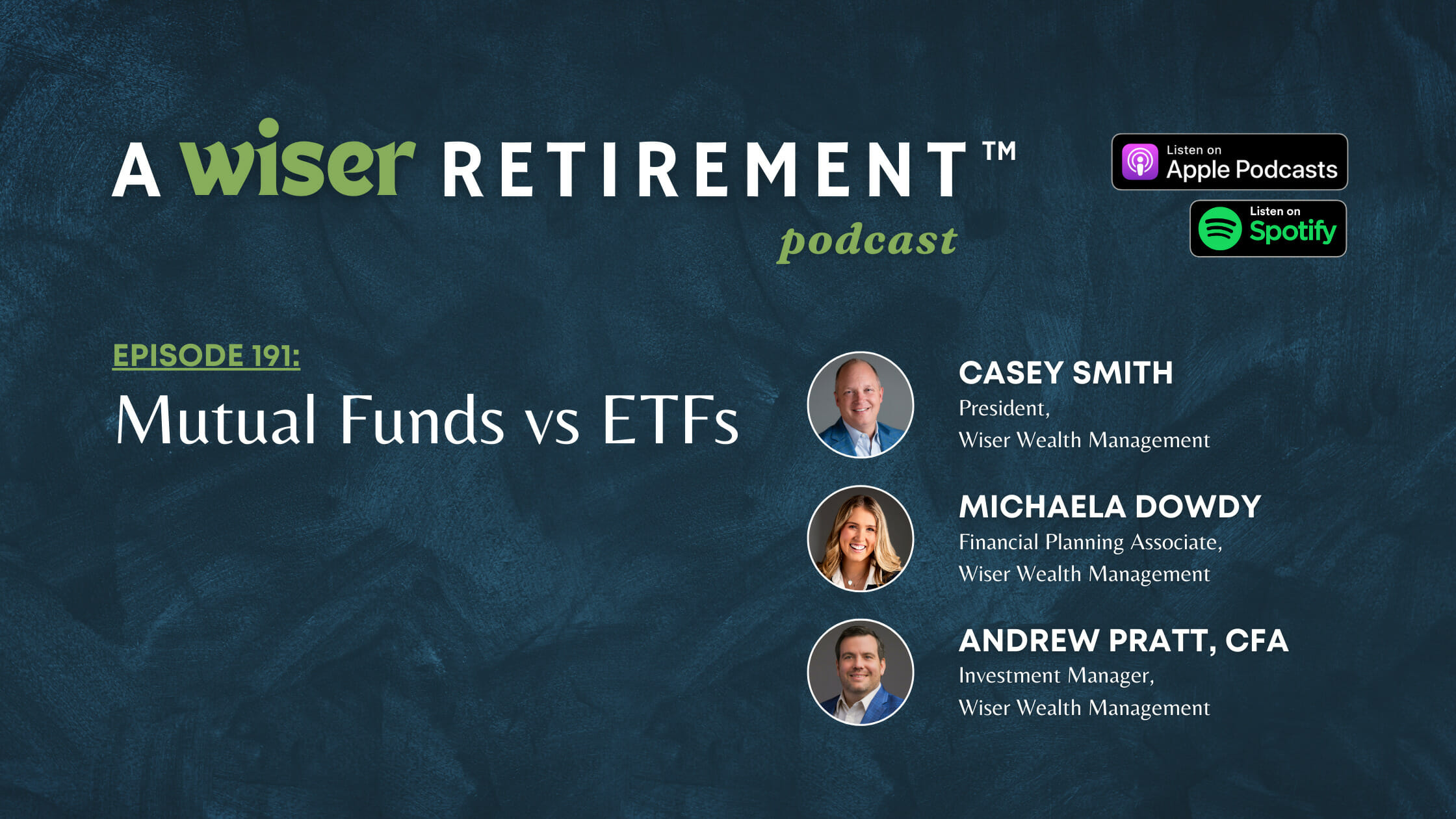
Mutual Funds vs ETFs
On this episode of A Wiser Retirement™ Podcast, Casey Smith, Michaela Dowdy, and Andrew Pratt, CFA, discuss the differences between mutual funds and ETFs. They also talk about why you shouldn’t be stuck in the mutual fund mentality.
Listen on Apple Podcasts or watch on YouTube:
SUMMARY:
Mutual Funds vs ETFs
There are many differences between mutual funds and ETFs. Mutual funds are priced at the end of the day, whereas with ETFs, you can buy and sell these throughout the day whenever the market is open. ETFs and mutual funds also have different costs and fees. You can expect to see a management fee or expense ratio for both. Typically, ETF fees are less because of the passive component in ETFs.
With an ETF, there are implicit and explicit costs, which refer to the liquidity and the bid-ask spread. So, both have some sort of net expense ratio or management fee attached to them. Even though mutual funds typically have higher management fees, you might buy an ETF thinking it is relatively inexpensive, but end up paying a big premium. This is something that can be hard for people to figure out on their own. So, our advice is to stick to the main ETFs or hire an investment manager.
When we talk about ETFs, we usually talk about passive management which means that they’re just tracking a benchmark and trying to perform in line with it. That benchmark could be the S&P 500, a sector, or it could be the Broad Bond Market Index. Most mutual funds are actively managed, which means they try to outperform a certain benchmark. Again, that benchmark could be the US market as a whole, the S&P 500, or others. Lately, there have been more actively traded ETFs coming out on the market.
ETNs and Highly Leveraged ETFs
Some of the commodity funds are actually ETNs (Exchange Traded Notes), meaning they don’t actually own anything. They are just a promissory note by a bank to pay you on the performance of something. We don’t use ETNs for that reason, because if an ETN shuts down, people lose all the money they put into it. A lot of times people don’t really think about the risk involved with certain investments until they are in that situation for themselves. If you are investing in the stock market on your own, you need to be extra cautious with risk, especially with ETNs, highly leveraged ETFs, or any other investment in which you don’t completely understand the risks.
Highly leveraged ETFs are attractive because of the great returns they promise. However, as with any investment with the promise of high returns, the risk associated with them is just as high. Leveraged ETFs, for example, reset daily. There’s no annual return for them and potentially a series of bad days can erase a really good day.
Don’t Be Stuck in the Mutual Fund Mentality
Even though ETFs have been around for over 20 years, many people are still stuck in the mutual fund mentality. Mutual funds were the investment class your parents likely invested in. However, the times have changed and as a firm we try to help people understand that ETFs are a more modern and efficient way of investing in the stock market.
Download our eBook: “Buyer Beware: Why do they keep trying to sell you that annuity?”
TIMESTAMPS:
0:00 Intro
05:00 Main Differences between Mutual Funds and ETFs
09:35 ETNs and Highly Leveraged ETFs
LINKS:
Learn more about Casey Smith and Andrew Pratt, CFA.
CONNECT:
Twitter, Instagram, Facebook, LinkedIn, and YouTube.
Learn more about A Wiser Retirement™ podcast and access previous episodes.
Share This Story, Choose Your Platform!
Wiser Wealth Management, Inc (“Wiser Wealth”) is a registered investment adviser with the U.S. Securities and Exchange Commission (SEC). As a registered investment adviser, Wiser Wealth and its employees are subject to various rules, filings, and requirements. You can visit the SEC’s website here to obtain further information on our firm or investment adviser’s registration.
Wiser Wealth’s website provides general information regarding our business along with access to additional investment related information, various financial calculators, and external / third party links. Material presented on this website is believed to be from reliable sources and is meant for informational purposes only. Wiser Wealth does not endorse or accept responsibility for the content of any third-party website and is not affiliated with any third-party website or social media page. Wiser Wealth does not expressly or implicitly adopt or endorse any of the expressions, opinions or content posted by third party websites or on social media pages. While Wiser Wealth uses reasonable efforts to obtain information from sources it believes to be reliable, we make no representation that the information or opinions contained in our publications are accurate, reliable, or complete.
To the extent that you utilize any financial calculators or links in our website, you acknowledge and understand that the information provided to you should not be construed as personal investment advice from Wiser Wealth or any of its investment professionals. Advice provided by Wiser Wealth is given only within the context of our contractual agreement with the client. Wiser Wealth does not offer legal, accounting or tax advice. Consult your own attorney, accountant, and other professionals for these services.





